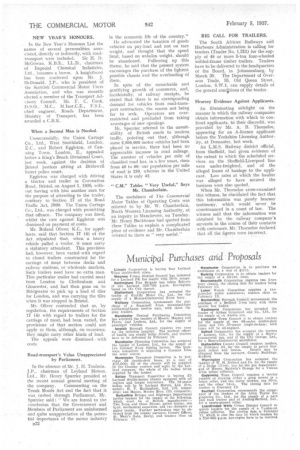NEW YEAR'S HONOURS.
Page 36

If you've noticed an error in this article please click here to report it so we can fix it.
In the New Year's Honours List the names of several personalities associated, directly or indirectly, with road transport were included. Sir H. D. McGowan, K.B.E., LL.D., chairman of Imperial Chemical Industries, Ltd.. becomes a baron. A knighthood has been conferred upon Mr. J. McDonald, J.P., who is president of the Scottish Commercial Motor Users Association, and who was recently elected a member of the Transport Advisory Council. Mr. F. C. Cook, D.S.O. M.C., M.Inst.C.E., F.S.I., chief engineer, Roads Department, Ministry of Transport, has been awarded a C.B.E.
When a Second Man is Needed.
Unsuccessfully, the Union Cartage Co., Ltd., West Smithfield, London, E.C., and Robert Eggleton, of Canning Town, London, E., appealed before a King's Bench Divisional Court, last week, against the decision of Bristol justices sitting at Bridewell Street police court.
Eggleton was charged with driving a tractor and trailer in Coronation Road, Bristol, on August 1, 1936, without having with him another man for the purpose of attending to the trailer, contrary to Section 17 of the Road Traffic Act, .1930. The Union Cartage Co., Ltd., was charged with permitting that offence. The company was fined, whilst the case against Eggleton was dismissed on payment of costs, Mr. Roland Oliver, K.C., for appellants, said that Section 17 (4) of the Act stipulated that, when a heavy vehicle pulled a trailer, it must carry a statutory attendant. This provision had, however; been varied with regard to closed trailers constructed for the carriage of meat between docks and railway stations, or wholesale markets. Such trailers need have no extra man. This particular trailer had carried meat from London to Cheltenham and Gloucester, and had then gone on to Bridgwater to pick up a load of tiles for London, and was carrying the tiles when it was stopped in Bristol.
Mr. Oliver contended that as, by regulation, the requirements of Section 17 (4) with regard to trailers for the carriage of meat, had been varied, the provisions of that section could not apply to them, although, on occasions, they might carry other kinds of load.
The appeals were dismissed . with costs.
Road-transport's Value Unappreciated by Parliament.
In the absence of Mr. J. H. Toulmin. J.P., chairman of Leyland Motors, Ltd., Mr. Henry Spurrier presided at the recent annual general meeting of the company. Commenting on the Trunk Roads Act and the fact that it was rushed through Parliament, Mr. Spurrier said : "We are forced to the conclusion that the Government and Members of Parliament are uninformed and quite unappreciative of the potential importance of the motor industry
in the economic life of the country."
He advocated the taxation of goods vehicleg on pay-load and not on tare weight, and thought that the speed limit, based on unladen weight, should be abandoned. Following up this theme, he said that the present system encourages the purchase of the lightest possible chassis and the overloading of them, In spite of the remarkable and gratifying growth of commerce, and, incidentally, of railway receipts, he stated that there is no corresponding demand for vehicles from road-transport contractors, the reason not being far to seek. Operators are overrestricted and precluded from taking avantages of new openings.
Mr. Spurrier referred to the unsuitability of British roads to modern traffic, pointing out that, although some 2,000,000 motor vehicles had been placed in service, there had been no appreciable increase in road mileage. The number of vehicles per mile of classified, road has, in a few years, risen from 40 to 60: our population per mile of road is 250, whereas in the United States it is only 42.
" C.M." Tables " Very Useful," Says Mr. Chamberlain. •
The usefulness of The commercial Motor Tables of Operating Costs was referred to by Mr. W. Chamberlain, North Western Licensing Authority, at an inquiry in Manchester, on Tuesday. Mr, Henry Backhouse had quoted from these Tables to explain a complicated piece of evidence and Mr. Chamberlain referred to them as " very useful."
BIG CALL FOR TRAILERS.
The South African Railways an1d Harbours Administration is calling for tenders (Tender No. 1,211) for the supply of 48 or more 5-ton four-wheeled welded-frame timber trailers. Tenders have to be delivered to the headquarters of the Board, in Johannesburg, by March 30. The Department of Overseas Trade, 35, Old Queen Street, London, SAVA, can supply details of the general conVions of the tender.
Hearsay Evidence Against Applicants.
An illuminating sidelight on the manner in which the railway companies obtain information with which to confront applicants, to their discredit, was provided by Mr, A. B. Thorneloe, appearing for an A-licence applicant before the Yorkshire Licensing Authority, at Doncaster, last week.
An L.M.S. Railway district official, from Sheffield, had given evidence of the extent to which the scheduled services on the Sheffield-Liverpool line were under-freighted, and of the alleged losses of haulage to the applicant. Low rates at which the haulier was alleged to have secured the business were also qucited. When Mr. Thomeloe cross-examined this witness, he elucidated the fact that this information was purely hearsay testimony, which would never be countenanced in a court of law. The witness said that the information was obtained by the railway company's servants in the course of their contacts with customers. Mr. Thorneloe declared that all the figures were incorrect.




























































































